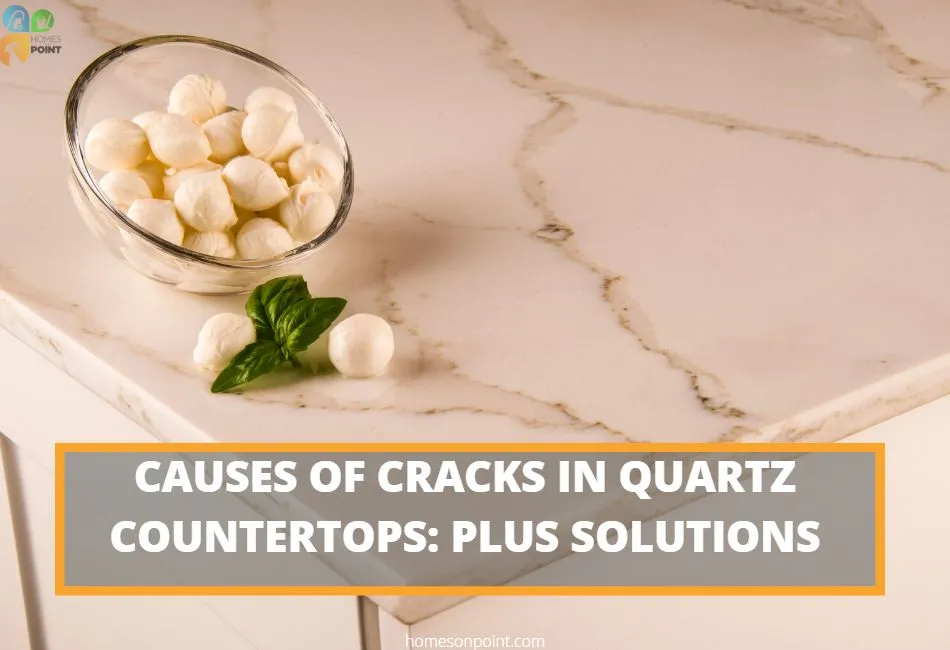Though highly durable, quartz countertops will not last as long as intended if not properly maintained. Indeed, they are not immune to damage and can develop scratches, chips, and cracks if care is not taken.
If you want to know how cracks in quartz countertops develop, stay with me. I will also tackle some steps you can follow to fix these cracks if they do happen, especially if you are tight on cash and cannot afford to replace your countertop entirely.
What Causes Quartz Countertops To Crack?
1. Poor Maintenance
The leading cause of cracks in quartz countertops is poor maintenance. To begin with, quartz countertops are highly durable and easy to clean and maintain. So what is your excuse if you allow your quartz countertop to get damaged because you did not keep it properly?
2. Exposing Your Quartz Countertop to Extreme Temperature
Do not expose your quartz countertop to extreme temperature changes, as that will make it susceptible to cracking. Your quartz countertop can take temperatures as hot as 150 degrees Celsius and as cold as 32 degree Celsius.
However, any temperature shock unsuitable for your quartz countertop will eventually result in hairline cracks. Therefore cease placing extremely hot or cold objects on your quartz countertops.
3. Cutting Directly on Your Quartz Countertop
Moreover, though quartz countertops are generally scratch-resistant, constantly using them as a cutting surface will eventually lead to cracks. If your quartz countertop comes into continuous contact with sharp objects, it can cause damage.
4. Dropping Heavy Objects on Your Quartz Countertop
Another component of poor maintenance is damping or leaving heavy objects on your quartz countertops. The excessive weight of whatever object or objects can eventually lead to cracks in your quartz countertops.
5. Poor Installation
If your quartz countertop is not installed correctly, it can cause cracks. If your quartz countertop is not evenly supported, some portions of it can bend or sag, which will eventually cause it to crack. Also, during installation, improper placement of seams can cause your quartz countertop to crack.
Again, if the installer fails to use the suitable adhesive and apply the correct quantity, it can cause your quartz countertop to keep moving while you use it. This may eventually lead to damages, including cracks.
6. Aging
Most quartz countertops are known to last at least 15 years before needing to be replaced or repaired. As such, it can crack when age catches up with your quartz countertop. Aged quartz countertops tend to give in to wear and tear, including cracks.
So, if you notice a crack or cracks in your quartz countertop, and you probably recently moved into the premises, you may want to inquire how old the building or kitchen installation is.
How To Fix Cracks In Quartz Countertops
There are two ways to fix cracks in quartz countertops, but before you consider any of these two methods, check your warranty card to see if the manufacturer or seller will take care of it for you.
Without the warranty, let’s fix your cracked quartz countertop.
Method 1
Items Needed
- Soft sponge/cloth
- Mild detergent
- Acetone
- Razor blade/sandpaper
- Masking tape
- Super glue (Cyanoacrylate)
- Quartz polish
Steps
- Begin by cleaning the surface of your quartz countertop, especially where the crack or cracks are. Apply some acetone on a soft sponge/cloth and clean your countertop. Follow that up with wiping with a dry cloth and leaving it to dry completely.
- Next, use masking tape to barricade the areas on your quartz countertop with the cracks. This will prevent the nearby uncracked areas from getting stained.
- Now, squeeze the super glue into the cracks in small quantities. You do not want it to “overflow,” as you do not know how deep the gaps are. Allow each layer of glue to dry before squeezing in some more.
- Remove the excess super glue on your quartz countertop with a razor blade or sandpaper but be gentle and careful. Then allow the super dry to dry completely.
- Clean the countertop’s surface with mild detergent and a soft sponge or cloth.
- Then polish your quartz countertop, as the fixed areas will look duller than the other portions of the countertop.
Method 2
Items Needed
- Epoxy/Clear resin/Acrylic adhesive
- Hardener
- Acetone
- Mild detergent
- Soft sponge/cloth
- Masking tape
- Sandpaper
- Craft stick
Steps
- Clean the surface of your quartz countertop, paying particular attention to the areas with cracks. Dampen a soft sponge or cloth with acetone, clean your countertop, wipe with a dry cloth, and let it dry.
- Using masking tape, define the cracked areas.
- Mix the clear resin/acrylic adhesive with the hardener and apply the mixture on the crack using a craft stick to push the mixture into the cracks. Allow it to dry once the gap is filled.
- Use sandpaper to sand the excess dry mixture. Clean afterward with mild detergent and water using a soft sponge/cloth. Then allow it to dry completely.
- Polish the filled areas so they blend in with the other parts of your quartz countertop.
Any of these two methods can help fix cracks in your quartz countertop. However, if the gaps are large and deep, you may need to replace your quartz countertop.
How To Prevent Your Quartz Countertop from Cracks
Now that we have fixed the cracks in your quartz countertop, let us look at measures to ensure they do not recur.
1. Proper Maintenance
The longevity of quartz countertops primarily lies in their maintenance. So, to prevent cracks in your quartz countertop, take care of them properly. One way to do so is not to expose it to extreme temperature changes.
Do not put excessively hot or cold objects on your quartz countertop. Use heat-resistant countertop protectors such as a hot pad, trivet, rack, or napkin on the countertop and put those hot or cold objects on them.
Again, do not place heavy objects, utensils, and cooking equipment on your quartz countertop. We already know that this will enable the occurrence of cracks sooner than later.
Moreover, please do not use your quartz countertop as a cutting board so it does not come into contact with knives. Knives will ruin the surface with time and cause cracks, so use cutting boards to chop ingredients on your quartz countertop.
2. Proper Installation
Because quartz countertops are very durable, most cracks can be attributed to the installation, especially if the user has a good maintenance culture. To avoid this, make sure your quartz countertop is installed correctly.
Correct installation of a quartz countertop involves getting a professional to the job. It also involves ensuring the seams are correctly placed, providing even support throughout the countertop’s base. Also, proper installation implies using suitable adhesive in the correct quantity.
Conclusion
Consequently, quartz countertops last a long time, but if you do not have them installed correctly or do not take care of them as you should, you will likely see cracks develop on them soon. If, for some reason, you get these cracks, depending on the severity, you can fix them with a few tools and materials. If the cracks are huge, however, unfortunately, you may need to replace your countertop.

